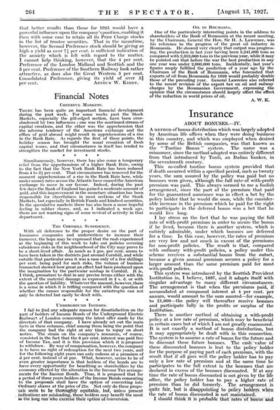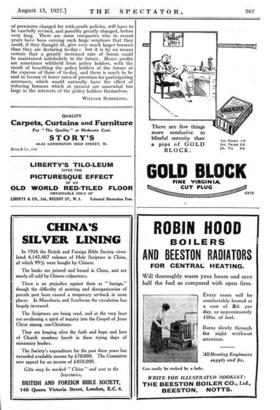Insurance
ABOUT BONUSES.—IV.
A METHOD of bonus distribution which was largely adopted by American• life offices when they were doing-business in this country, and which was employed when desired by some of the British companies, was that known as the " Tontine Bonus " system. The name was a misnomer, since the method adopted was entirely different from that introduced by Tonti, an Italian banker, in the seventeenth century.
This so-called tontine bonus system provided that if death occurred within a specified period, such as twenty years, the sum assured by the policy was paid but no bonuses were given, although the full- rate•of with-profit premium was paid. This always Seemed to me a foolish arrangement,' since the part of the premium that paid for the guaranteed assurance was in effect a bet by the policy holder that he would die soon, while the consider- able increase in the premium which he paid for the right to participate in the deferred bonus was a bet that he would live long. I lay stress 'on the fact that he was paying the full rate of with-profit premium in order to secure the bonus if he lived, because there is another system, which is entirely admirable, under which bonuses are deferred for a time. In this case, however, the rates of premium are very low and not much in excess of the premiums for non-profit policies. The result is that; compared with ordinary with-profit policies, a policy under this scheme receives a substantial bonus from the outset, because a given annual premium secures a policy for a larger amount than the same premium paid for most with-profit policies.
This system was introduced by the Scottish Provident Institution in, I believe, 1837, and it adapts itself with singular advantage to many different circumstances. The arrangement is that when the premiums paid, if accumulated at compound interest at 4 per cent. per annum, would amount to the sum assured—for example, to £1,000—the policy will thereafter receive bonuses and participate fully in the profits or surplus of the Institution.
There is another method of obtaining a with-profit policy at a low rate of premium,-which may be beneficial in certain cases but of which I am not greatly enamoured. It is not exactly a method of bonus distribution, but it may appropriately be dealt with in this connection. The system is to assume a rate of bonus for the future and to discount these future bonuses. The cash-value bf these discounted bonuses is lent to the policy' holder for the purpose of paying part of each premium, with the result that if all goes well the policy holder has to pay only a low rate of premium and at the same time he participates to the full extent in the bonuses that are declared in excess of the bonuses discounted. If at any time the rate of bonus discounted is not given by the life office, the policy holder has to pay a higher rate of premium than he did formerly. The arrangement is quite fair, but is disappointing to policy holders when the rate of bonus discounted is not maintained.
I Aiofild think it is 'probable thiit-iiiteS -of bbnns and of premiums charged for with-profit policies, will have to be carefully revised, and possibly greatly changed, before very long. There are some companies who in recent years have been earning such large surpluses that they could, if they thought fit, give very much larger bonuses than they are declaring to-day ; but it is by no means certain that a greatly increased rate of bonus could be maintained indefinitely in the future. Hence profits are sometimes withheld from policy holders, with the result of benefiting the policy holders of the future at the expense of those of to-day, and there is much to be said in favour of lower rates of premium for participating assurance, which would naturally have the effect of reducing bonuses which at present are somewhat too large in the interests of the policy holders themselves.
WILLIAM SCHOOLING.































 Previous page
Previous page